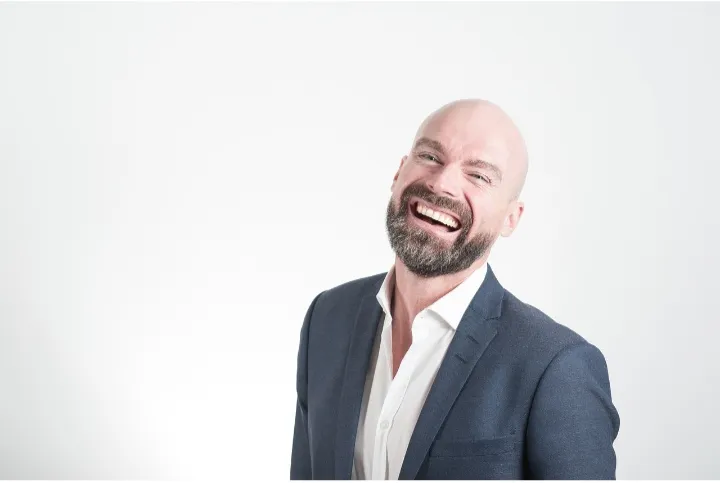
Hola amigas y amigos de Holos & Lotus. La risa tiene poderes terapéuticos, es reconocido por la ciencia. Por tanto, no es extraño que las personas que conozco con mejor calidad de vida rían "hasta por gusto", como decimos aqui.
No sé trata de ir por la vida haciendo el payaso. De estar riéndonos por todo, mucho menos reírse de cada cosa desagradable que nos suceda.
Lo que si que es cierto es que debemos aprender a ver las situaciones que nos suceden desde todos los ángulos posibles. Encontrarle el lado menos oscuro a las cosas desagradables es una herramienta que podemos utilizar para nuestro bienestar.
Aprender a reírnos de lo que nos pasa depende también de la imagen que tengamos de nosotros mismos. Aceptarnos como somos, con nuestros lados fuertes y nuestros lados frágiles. Creo que para ello es fundamental la capacidad de ser resilientes.
Por otro lado, es buena idea aprovechar las bondades del contagio emocional. Tanto en nuestro beneficio como para el de los que nos rodean.
¿Te ha pasado que te encuentras en un estado anímico que no es el mejor y de pronto te encuentras con alguien que te hace reír? ¡A mí sí¡ ¿Que bueno cierto?
El caso es que esa buena vibra se contagia, o al menos existe la posibilidad de ello. La risa tiene ese poder.
De igual modo, podemos utilizar este conocimiento para el beneficio de quienes nos rodean, de nuestro entorno. Hacer reir a alguien puede ser el mayor regalo que le puedes ofrecer en un momento de incertidumbre, de oscuridad.
Cabe entonces preguntarnos: ¿Que tanto debemos aprender a validar nuestro derecho a reir? Creo que debemos aprender a hacerlo si o si. Todo lo que contribuya a nuestro bienestar sin hacer daño a otros es válido.
A veces olvidamos eso. En especial cuando estamos bajo estrés. Pero es ahí donde debemos emplear a fondo nuestros recursos de afrontamiento. Reconocer nuestro derecho a reir, a luchar por nuestra salud emocional es fundamental.
Esto aplica incluso a la posibilidad de reírnos de alguna de esas veces en que nos sucedió algo ridículo. En lugar de sentirnos abochornados por ello podemos mirarlo desde otra perspectiva.
Entiendo que muchas situaciones no nos generan risa. Hemos actuado como no deberíamos haberlo hecho, pero seguimos vivos. Reírme de mis "tonterías" significa quitarle crédito a la vergüenza que experimento. Es como desacreditarlas.
Yo por ejemplo, utilizo al chiste para liberar la tensión. Me ha pasado más de una vez que estoy frente a personas en una situación embarazosa. Entonces trato de hacer un chiste donde incluso quedó mal parado.
En la mayoría de las ocasiones provoco la risa en los demás y también me rio yo. Así libero tensiones en mi y en las personas que me rodean en ese momento.
Más de una vez me han dicho: "no sé cómo puedes bromear en un momento como este". "Tampoco yo", respondo. En realidad si se. No es que no sienta preocupación. Es más un mecanismo de defensa para auto afirmarme en una situación que percibo como complicada.
Eso hace falta también. La vida es demasiado corta como para vivirla con arrepentimientos. Me rio de mis "metidas de pata", cómo se dice por aquí. Me rio para recordarme que soy humano y que tengo derecho a equivocarme.
También rio para amenizar el proceso de aprendizaje. Tenlo por seguro, toda situación en la vida, por difícil o ridícula que pueda ser guarda detrás una enseñanza. Así que la risa me ayuda a "enfriar la cabeza" y despues analizar mejor el asunto.

A propósito de ello, recuerdo una situación que en su momento me generó tensión pero pasado el tiempo he aprendido a reirme de ella. Fue en mi primera visita a la capital cubana.
La Habana es una ciudad mágica, Pero igual puede resultar desconcertante para un joven que apenas a caminado por las "4 calles" de su ciudad natal.
Me sucedió que bajando 23, una céntrica calle de la urbe caminaba mirando hacia todos lados. Digo hacia todos lados y no exagero. Los edificios, los carros al pasar, los carteles lumínicos, incluso los indicadores ubicados en las esquinas con el nombre de las calles.
Me convertí en el centro de atención de todo aquel con quien me cruzaba. Nunca me gustó ser el centro de atención. Menos en una situación de la que salía mal parado.
Imaginen a este "guajiro" cuando alguien se acercó y me pregunto: "¿Y tu de dónde eres?" No sabía dónde poner la cabeza, como el avestruz.
Sin embargo, en ese momento anestesie la vergüenza, trague en seco, saque mi mejor sonrisa y respondí: "De Pinar". Decir que eres de Pinar del Rio a un habanero es como darle carga a la máquina de la burla. Pero lo hice a propósito, porque sentí mi orgullo herido.
Recordar esa situación a día de hoy me resulta divertido. Me sentó mal el tono de burla con el que me hicieron la pregunta, pero comprendí que también yo puse mi granito de arena. Vaya que le puse en bandeja de plata la oportunidad de reírse del pinareño.
Momentos como esos me han hecho reevaluar cada situación que me sucede y ver si merece algo de risa. Si lo merece me rio de mi mismo sin complejos.
Unas veces lo hago a solas, Pero no desaprovecho la oportunidad si encuentro a alguien que como yo tenía complejos para ver el lado cómico de la situación para que vea que no solo a él le suceden cosas como esas.
Agradecido de tu compañía hasta el final te dejo un abrazo de amigo, Pero antes quiero invitar a los amigos @davidsantafe y @yventura exponer sus criterios certeros sobre el valor de una carcajada.
Texto traducido al inglés por DeepLTranslate.
English Version

Hello friends of Holos & Lotus. Laughter has therapeutic powers, it is recognized by science. Therefore, it is not strange that the people I know with the best quality of life laugh "even for pleasure", as we say here.
It is not about going through life clowning around. It is not about laughing at everything, much less laughing at every unpleasant thing that happens to us.
What is true is that we must learn to see the situations that happen to us from all possible angles. Finding the less dark side of unpleasant things is a tool that we can use for our well-being.
Learning to laugh at what happens to us also depends on the image we have of ourselves. Accepting ourselves as we are, with our strong sides and our fragile sides. I believe that the ability to be resilient is fundamental to this.
On the other hand, it is a good idea to take advantage of the benefits of emotional contagion. Both for our benefit and for the benefit of those around us.
Has it ever happened to you that you find yourself in a mood that is not the best and suddenly you meet someone who makes you laugh? For me, it does!
The thing is that this good vibe is contagious, or at least there is the possibility of it. Laughter has that power.
In the same way, we can use this knowledge for the benefit of those around us, of our environment. Making someone laugh can be the greatest gift you can offer them in a moment of uncertainty, of darkness.
So how much should we learn to validate our right to laugh? I believe that we must learn to do so, yes or yes. Anything that contributes to our well-being without harming others is valid.
Sometimes we forget that. Especially when we are under stress. But that's where we need to fully employ our coping resources. Recognizing our right to laugh, to fight for our emotional health is fundamental.
This even applies to the possibility of laughing at one of those times when something ridiculous happened to us. Instead of feeling embarrassed about it, we can look at it from another perspective.
I understand that many situations do not make us laugh. We have acted the way we shouldn't have, but we are still alive. Laughing at my "foolishness" means taking credit away from the shame I experience. It is like discrediting them.
I, for example, use the joke to release tension. It has happened to me more than once when I am in front of people in an embarrassing situation. Then I try to make a joke where I even look bad.
Most of the time I provoke laughter in others and I laugh too. This way I release tensions in me and in the people around me at that moment.
More than once I have been told, "I don't know how you can joke at a time like this". "Neither do I," I reply. Actually, I do. It's not that I don't feel concern. It's more of a defense mechanism to assert myself in a situation I perceive as complicated.
That's what's needed too. Life is too short to live it with regrets. I laugh at my "screw-ups", as they say around here. I laugh to remind myself that I am human and that I have the right to make mistakes.
I also laugh to liven up the learning process. Be sure, every situation in life, no matter how difficult or ridiculous it may be, has a lesson behind it. So laughter helps me to "cool my head" and then analyze the matter better.

In this regard, I remember a situation that at the time generated tension in me, but over time I have learned to laugh at it. It was my first visit to the Cuban capital.
Havana is a magical city, but it can still be disconcerting for a young man who has barely walked the "4 streets" of his hometown.
It happened to me that going down 23, a central street of the city, I was walking looking everywhere. I say everywhere and I am not exaggerating. The buildings, the cars passing by, the luminous signs, even the indicators located on the corners with the name of the streets.
I became the center of attention of everyone I came across. I never liked being the center of attention. I never liked to be the center of attention, especially in a situation where I came out of it badly.
Imagine this "guajiro" when someone approached me and asked me: "And where are you from?" I did not know where to put my head, like an ostrich.
However, at that moment I anesthetized the embarrassment, swallowed dryly, brought out my best smile and answered, "From Pinar." Saying that you are from Pinar del Rio to a habanero is like charging the mockery machine. But I did it on purpose, because I felt my pride hurt.
Remembering that situation today is funny to me. The mocking tone in which I was asked the question made me feel bad, but I understood that I also did my bit. I really gave him the opportunity to laugh at the Pinareño on a silver platter.
Moments like those have made me reevaluate every situation that happens to me and see if it deserves some laughter. If it deserves it, I laugh at myself without complexes.
Sometimes I do it alone, but I don't waste the opportunity if I meet someone who like me had complexes to see the funny side of the situation so he can see that things like that don't only happen to him.
But first I want to invite my friends @davidsantafe and @yventura to expose their accurate criteria about the value of a laugh.
Text translated into English by DeepLTranslate.
